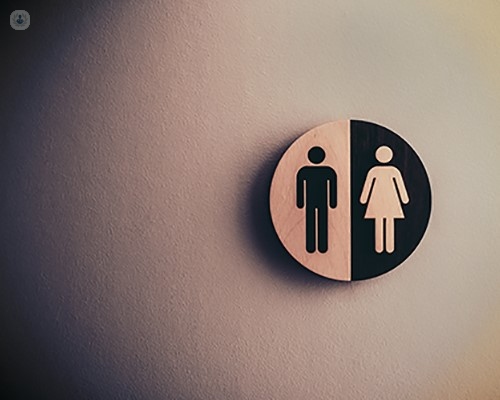Insights on urinary incontinence: Understanding and treatment
Escrito por:In his latest online article, Mr Matthew Izett-Kay gives us his insights into urinary incontinence. He talks about what it is, how it affects people and the treatment options.

What is urinary incontinence?
Urinary incontinence is a prevalent condition that primarily affects women, impacting nearly half of those over the age of 40. This condition involves the involuntary loss of urine, occurring at inconvenient times when a restroom is not readily accessible. I specialise in managing two main types of incontinence.
The first type is stress incontinence, characterised by leakage during activities such as coughing, sneezing, physical exertion, lifting a child, or rushing for the bus. The second type is urgent incontinence, where there is a sudden and compelling need to reach the restroom but insufficient time to do so. Imagine reaching your front door, inserting the key, and suddenly experiencing leakage. This urgency is often associated with overactive bladder syndrome, a condition marked by frequent trips to the toilet, nighttime awakenings, and a persistent feeling that the bladder is not completely empty.
These prevalent and impactful conditions significantly affect the quality of life for those experiencing urinary incontinence.
How does it affect people?
Urinary incontinence significantly affects the lives of those grappling with this condition, extending its impact beyond mere physical discomfort. Social activities become constrained, and the confidence to engage in travel or attend exercise classes diminishes.
Consider the challenges faced by individuals who hesitate to partake in activities such as jumping on a trampoline with their kids or enjoying moments in the garden, all due to concerns about potential leakage. The worries extend to holiday planning, with fears of being caught without a restroom nearby, inhibiting the freedom to explore and enjoy new places.
Research underscores the substantial impact of urinary incontinence on women's health-related quality of life. It manifests in low mood, feelings of restriction, and social isolation. Interpersonal relationships with partners and children may be strained, and there's a noticeable effect on mood and body image. The cumulative burden of these challenges is considerable.
As part of my role, I collaborate with individuals to identify areas in their lives where improvements can be made through the effective treatment of urinary incontinence. Working together, we aim to enhance overall well-being and alleviate the burdens associated with this condition.
What are the treatment options for urinary incontinence?
When you entrust me with addressing your bladder problems and urinary incontinence, our collaboration goes beyond merely seeking treatment. I am dedicated to delving into a comprehensive understanding of your bladder function, your medical history, and the factors influencing your condition. Rest assured, you are consulting with a nationally renowned expert in the management of bladder dysfunction and incontinence.
The array of treatment options available to you depends on various factors, such as the type of incontinence (stress or urgent), your prior treatment experiences, and the impact on your quality of life. Together, we will explore and discuss the treatment possibilities tailored to your situation.
Our initial approach often involves pelvic floor physiotherapy, and I will guide you through the potential benefits and feasibility of this option. From there, we can progress through a spectrum of therapeutics, ranging from conservative measures like tablets or injections to more significant interventions, including surgery. Whether it's a straightforward procedure or a more intricate keyhole or endoscopic management, my expertise spans a wide spectrum.
It's crucial to acknowledge that each treatment option comes with its own set of advantages and disadvantages, along with varying risks and benefits. As my patient, you can expect thorough discussions on these choices, allowing us to collaboratively determine the most suitable course to enhance your quality of life and effectively manage your bladder and urinary incontinence.
Mr Matthew Izett-Kay is a consultant gynaecologist and subspecialist urogynaecologist. You can schedule an appointment with Mr Izett-Kay on his Top Doctors profile.


